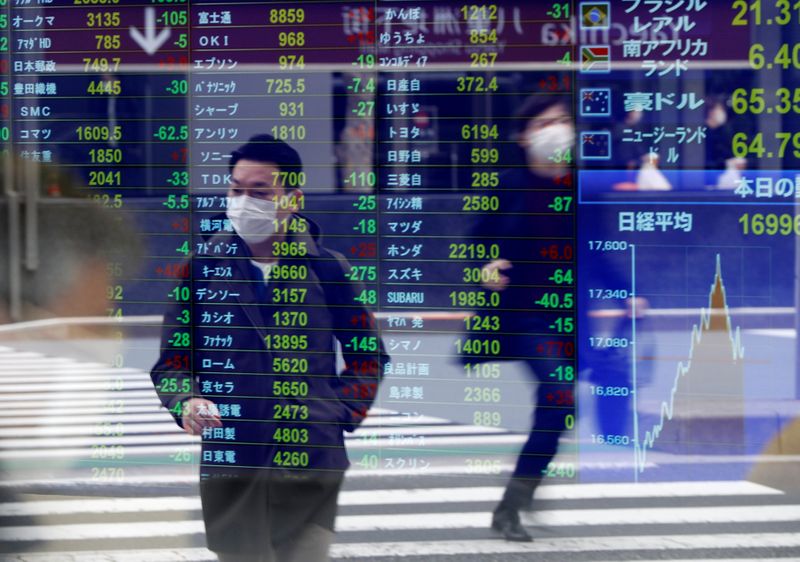By Chibuike Oguh
NEW YORK (Reuters) - Asian stocks were set to fall on Thursday after gloomy economic projections from the U.S. Federal Reserve sent the greenback and most Wall Street shares lower.
Fed officials at their policy meeting on Wednesday said U.S. gross domestic product is expected to decline 6.5% this year. They also flagged the need to keep the key interest rate near zero through at least 2022.
"The Fed is basically saying they're going to keep the system solvent and at the macro level there's no room for failures but at the micro level there'd be some businesses that won't survive," said Jamie Cox, Managing Partner at Harris Financial Group.
Australian S&P/ASX 200 futures were down 1.08%, while {{178|Japan's NiNikkei 225 futures fell 1.2%. Hong Kong's Hang Seng index futures were 0.31% lower.
The S&P 500 and Dow Jones benchmarks both moved between gains and losses after the Fed statement, which was the first projections from the U.S. central bank on the economy since the coronavirus outbreak.
An S&P index of bank shares, which tend to benefit from rising rates, fell 5.8% in its biggest daily percentage decline since April 15, and the S&P 500 financial index was the biggest drag on the benchmark index.
"The broad downgrade in banking stocks came as the market wasn't sure what the extent of their loan loss provisions would be," Cox said.
The Nasdaq benchmark, however, continued its record-breaking rally for the third consecutive session helped by gains in shares of Microsoft (NASDAQ:MSFT) and Apple (NASDAQ:AAPL), with investors viewing technology as a defensive sector with massive growth opportunities, Cox added.
On Wall Street, the Dow Jones Industrial Average fell 1.04%, the S&P 500 lost 0.53%, while the Nasdaq Composite gained 0.67%.
The dollar fell to a three-month trough against the euro, sterling and Swiss franc after the Fed's pledge to keep monetary policy loose until the U.S. economy is back on track.
The greenback fell about 0.4% against a basket of major currencies to 95.882 after earlier sliding to 95.714, a level not seen since mid-March.
The euro rose as high as $1.1422 and sterling reached $1.2812, with the dollar hitting a three-month low of 0.9425 franc versus the Swiss currency.
U.S. Treasury yields fell as the Fed promised to maintain monthly bond purchases at "the current pace" of about $80 billion in Treasuries and $40 billion in agency and mortgage-backed securities.
Benchmark 10-year Treasury yields fell 9 basis points to 0.744%. Two-year yields, which are the most sensitive to rate changes, fell 3 basis points to 0.177%.
Oil rebounded from earlier losses, even as U.S. data showed crude inventories rose to a record high, reviving worries of a persistent glut due to weak demand.
Crude stocks rose by 5.7 million barrels in the week to June 5 to 538.1 million barrels, according to a U.S. Energy Information Administration report. [EIA/S]

Brent crude settled up 55 cents to $41.73 a barrel. U.S. West Texas Intermediate (WTI) rose 66 cents to $39.60 after falling more than 2% in the session.
